Rushden Echo & Argus, 9th October 1914, transcribed by Kay Collins
Higham Ferrers Boys in Action
Ex-Members of the Church Lads’ Brigade – In the King’s Royal Rifles
The special training of the C.L.B. Batt. of the King’s Royal Rifles is taking place at Durham. Its 1,100 men are all ex-members of the C.L.B. Col. Kindersley-Porcher is in command. He is late of the Coldstream Guards, and for many years commanded the South-Western Districts of the C.L.B. Col. Kinderley-Porcher examined and signed the notices of the following ex-members of the Higham Ferrers Church Lads’ Brigade who were successful in entering the King’s Royal Rifles and other regiments:- George Groome, Arthur Bates, Thomas Pearcey, 6th Battalion Northamptonshire Regiment; L. Clifton, Royal Field Artilery; K. Bailey, H. Moulton, R. Twelvetree, King’s Royal Rifles, special C.L.B. Battalion; Sergt. W. Smith, 1st Sherwood Foresters. E. Espin failed to pass the medical examination for the King’s Royal Rifles, and P. Newell failed to obtain admission to the King’s Royal Rifles as being under the required age.
|
Rushden Echo Friday 4th December 1914, transcribed by Susan Manton
Souvenirs of the War - Some Interesting Mementoes - Sent by a Higham Ferrers Man
A Higham Ferrers man, Private W. A. Fletton, R.A.M.C. sent home from the Military Hospital, Devonport, a parcel of interesting souvenirs of the war, which he has had given to him. Writing to his parents he says:-
“We have got a lot more wounded in and I have got all Belgians this time, so you can bet I have a rare time. I cannot understand their language but there is one who can speak English, so I ask him what they want. I have had four Belgian buttons made into hat pins for mother. Thank Lizzie for the chocolate.”
In a note to his father he says:-“ I am sending you a few coins as I thought you would not want a brooch or a hat pin! I am sending you the enclosed relics. There is a Belgian shut-knife, a German shilling (one mark) and one French Napoleon III. The other coins are all Belgian. The one franc piece is worth 10d in English, the 50 cent piece worth 5d, three 10 cents each worth 1d and three 5 cents worth ½d. I want you to keep them until I come home. There is a German cartridge (with nickel bullet), two Belgian cartridges (copper bullets) and two English cartridges.”
Private Fletton also enclosed in the parcel an image, symbolic of the religion of the Belgians. Last, and not least important, was piece of biscuit which he says they have for tea. We think that soldiers who have to feed on such edibles will never grumble about “dry” bread again. The biscuit was about the same in softness as piece of wood sawn off a plank, and looked about as appetising.
|
Rushden Echo Friday 4th December 1914, transcribed by Susan Manton
Higham Ferrers Soldier in Hospital - False Rumour of Wounds
We are pleased to contradict the rumour that Pte. Adams, a Higham “Steelback” has been wounded. He is, however, in hospital at Boulogne, from where he writes to his parents as follows: “I have been sent back from the firing line to the above hospital owing to a chill. It is luck I am not wounded and I hope I shall not be here very long. This is being written for me, as I have to keep under the clothes. If you write to the above address I shall probably get it before I leave here. There’s no need to worry over me.”
The letter was posted on Monday this week.
|
Rushden Echo Friday 4th December 1914, transcribed by Susan Manton
Welcome Rest From Fighting - Higham Gunner At the Front
One of the guns with which the English are trying to smash the Germans is used by Gunner G. Mead (Higham Ferrers) of the Royal Field Artillery. Writing to his sister from the front this week he says:-“ We have been relieved for a rest again. If you remember, I wrote and told Albert (his brother) we were on a rest camp, but it only lasted 24 hours. We are in for longer this time. The whole division are having a rest for a few days so you see I have a chance to write. We are having it very cold out here now. There is snow on the ground and the sharp frosts make the roads unsafe to walk on. If the weather does not soon alter we shall find it a very hard job to get the horses along. I had a rotten bit of luck last night. I was out for a stroll and lost my tobacco pouch! When I have finished with the colours I am going to join the Police Force. I don’t think I shall do more than six years in this.
|
Rushden Echo, 1st January 1915, transcribed by Kay Collins
Higham Ferrers Brothers – German Trenches Captured
Private J Freeman (Higham Ferrers), of the 1st Bedfordshires, writing on Dec. 25th from hospital at La Havre, France, to his mother, Mrs J Freeman, of Higham Ferrers, says: “My throat does not seem to get any better. We have been having plenty of rain out here just lately. I should like to have been home for Christmas, but I expect I shall have to be satisfied where I am.”
His brother, Private Bernard Freeman, of the 1st Northamptons, writes home under date Dec 25th: “I am writing to let you know I received the ‘Rushden Echo’ all right, and it has a good round. Excuse my writing as it is getting very dark where we are, and it is Christmas night. Private Magee is on the machine gun with me. The first night we were in the trenches we made a brilliant charge and captured some trenches from the Germans. I hope you had a good Christmas. I had bully beef for my dinner. I am sending Queen Mary’s postcard home to you: I cannot carry it about with me, as it would get smashed.”
|
|
Rushden Echo, 9th April 1915, transcribed by Kay Collins
German Fleet Wanted – To Come Out and Go Under Attack
Narrow escapes from German Aviators – The Bombardment of Westende
 Stoker C. Houghton (Higham Ferrers) of H.M.S. Venerable, is again home on 3 days’ leave. He again kindly favoured a representative of the “Rushden Echo” with an interview: Stoker C. Houghton (Higham Ferrers) of H.M.S. Venerable, is again home on 3 days’ leave. He again kindly favoured a representative of the “Rushden Echo” with an interview:
“My ship,” he said, “has been principally engaged in co-operating with the British land forces in trying to turn the Germans out of Belgium. We have been assisting in the bombardment of Westende, and have also dropped a few shells by way of saying ‘How d’ye do?’ amongst the German troops.
“Whilst we have been cruising about we have several times sighted German submarines but have never yet managed to get in range, and this time out we have not been attacked by them, although we had one narrow escape from German aviators. We had just anchored off the Belgian coast when we noticed a Taube aeroplane flying toward us. We sounded the bugle for the firing parties to man the guns for aeroplane attack, and the men at once took up their positions. However, the German aviator came right over us and dropped several bombs, one falling close by our ship on the starboard side amidships but it dropped harmlessly in the water. Another dropped close by a mine-sweeper, and another near to a destroyer, but fortunately no damaged was done. The German didn’t stay long, however, as no sooner did our aircraft get up from the Belgian coast to chase him than off he bunked.
“I really haven’t a great deal to tell you, as there is nothing very exciting happening. I wish there was. All we are waiting for is the German grand fleet to come out and go under. We can’t even get a smell of a German, and our chaps are getting very impatient and dissatisfied at having no excitement. The happiest time we get is when we are plunking a few shots into something or other.
“Of course, when we are dropping a few into the Germans they don’t forget to return the compliment, but although their shells have dropped all round us, and actually passed over us, our boat had sustained no damage whatsoever up to the present.
“Our chaps until recently kept a black Belgian cat on board for good luck. I am sorry to say that the poor cat got killed the last time out through a door falling on him, and some of our chaps being rather superstitious have taken this as a bad omen. He was a great favourite, especially with the officers.”
Stoker Houghton has a brother, Corpl. Albert Houghton, of the 6th Dragoons, fighting in the trenches. In a letter sent to his brother recently he complains that he is not getting enough scrapping. He says “They seem to forget that our regiment is on active service.”
|
Rushden Echo, 21st May 1915, transcribed by Kay Collins
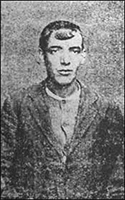 Higham Ferrers Soldier in Hospital Wounded Higham Ferrers Soldier in Hospital Wounded
Pte P Patenall (Higham Ferrers), son of Mr and Mrs William Patenall, of Higham Ferrers, has been unofficially reported wounded. In a letter to his sister, however, he makes no mention of having received any wounds, but says he is in hospital. He writes:-
“No doubt you will be surprised to hear I am in hospital somewhere in Frances. I have been in twice now. The first time I went in was May 8th and I came out on the 13th. I had something the matter with my hand. It got better. Now I am in again. You need not worry as i quite think I shall be better in a few weeks’ time; well I hope so. I am not going to say anything about the war but I shall be very glad when it is all over. I have been with a lot of chaps from Rushden, some of them have got killed and wounded, I am sorry to say. I am with a Rushden chap in hospital. We are having some nice weather out here.
|
Rushden Echo, 4th June 1915, transcribed by Kay Collins
Higham Ferrers Man Now in Hospital
Gunner G. Mead (Higham Ferrers) has been hit by a piece of shell and is now in the Liverpool Royal Infirmary. A piece of the shell lodged under the eye, but has now been successfully extracted. He says it is quite a treat being in hospital, as he had not before been in a bed since the beginning of the war. He hopes to be quite well again shortly.
|
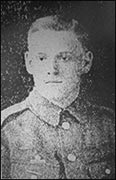 Rushden Echo, 17th September 1915, transcribed by Gill Hollis Rushden Echo, 17th September 1915, transcribed by Gill Hollis
Rushden Soldier Wounded
Private J. Bishton, son of Mr. and Mrs. H. Bishton, of Higham Ferrers, formerly of Higham-road, Rushden, reported in our last issue wounded in the Dardanelles.
|
|
Rushden Echo, Friday December 10th 1915, transcribed by Carol Jones
Higham Ferrers Soldier - With the Mediterranean Force
Private A H Winter Recovered from Dysentery
We Take No Notice of Funerals
A member of the staff of the Rushden Echo has received an interesting letter from a Higham Ferrers man Private A H Winter 22723 "C" Coy 1st Garrison Battalion, Essex Regiment, British Expeditionary Force from which we extract the following; I am all right at present having got over dysentery. It is very hot here in the daytime and cold at night. We have plenty of fires and other livestock. I am getting about seasoned to the climate now. We have some dust storms to contend with.
We are a bit quiet up here now. How are they going on in France? I have only seen one paper since I came out. Will you kindly send me the Rushden Echo and I shall get some local news.
It would surprise you to see what we are among - Indians, Australians, New Zealanders, Egyptians and other soldiers but we get on well together. I can assure you it has been hard fighting up here and the officers go through it and rough it the same as the men.
We take no notice of funerals and we are not downhearted. We get the allowance of tobacco once a week. I have been out here four months. We are up the lam the only man from Higham Ferrers in this regiment. We are among the mountains and we get the earth for our bed but it is for England that I am doing my bit. I hope I shall return some day to the old borough. It is no use telling you about the fighting as you know more than I do. I have been among the Welsh that were at Higham. They got cut up and lost nearly all their officers. The 4th Northants are expecting to get a rest so they will be sent down to a rest camp.
|
|
Rushden Echo, 31st Dec 1915, transcribed by John Collins
Higham Ferrers Soldier - Home on Leave
Private Townsend’s Experiences - In The Dardanelles
Gallipoli a “Rough Shop” - The Death of Pte. Cyril Cook, of Rushden
Private Herbert Townsend, B Company, 4th Northants, son of Mr. and Mrs. Townsend, of Warmond’s Hill, Higham Ferrers, is home on six weeks’ leave, being convalescent after an attack of enteric fever at the Dardanelles. Interviewed by a “Rushden Echo” representative, he said:-
“We landed on the Gallipoli Peninsular on August 15th and immediately went into the trenches. I think it was unwise of the authorities to place us immediately in the firing line without giving us a chance of becoming acclimatised. At any rate, more of us were out of action by sickness than by wounds, for the climate was terrible. What with the flies, the heat, the lack of water, and a hundred other disagreeable things, I think Gallipoli altogether was a ‘rough shop.’
“I was in Gallipoli just over six weeks, and while there I saw Private Cyril Cook, of Rushden, shot through the head. There was an observation party of six men, including Cyril Cook and myself. As I came off the observation post Cyril Cook went on. When he had been there twenty minutes he was shot through the head. He was not killed instantly, but called for water. We knew, however, that his wound was fatal, and the last I saw of him was as he was being carried away.
“I have had some narrow escapes in Gallipoli. We used to have voluntary bathing parades at one time, and, one day, while we were bathing, some Turkish gunners off Beachy Bill, as it was called, spotted us and bombarded us for half-an-hour. Nobody was hit, however, and presently a British cruiser steamed up and silenced the Turkish battery with her guns. So we had our bathe after all.
“The same afternoon we went bathing again and on this occasion Capt. Dorman was killed by shrapnel. This put the stopper on bathing.
“I had many more escapes, but I took no notice of them. It is marvellous how soon you get used to escapades and firing in the fighting line.
“I came through without a wound, but contracted enteric fever in the trenches. I was taken suddenly ill one morning. At first I thought it was influenza. I had my temperature taken and was placed on the boat immediately. I was unconscious for three days, and was taken to Gibraltar.
“The Royal Welsh Fusiliers, who were billeted at Higham and Rushden, were entrenched on our right. I don’t think there are many of the chaps left who went out with me.
“As to the whole campaign in the Dardanelles, it seems to me that very little progress has been made. We are practically at a standstill. The British and French are merely holding the Turks and preventing them from going to help their comrades in other quarters.”
|
Rushden Echo, 21 April 1916, transcribed by Kay Collins
Promotion for Higham Ferrers Soldier - The Value of the Boys’ Brigade
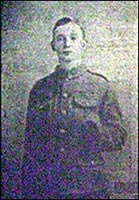 We are pleased to report that William Webb (Higham Ferrers), of the Northants Regiment, who is with the Egyptian Expeditionary Forces, son of Mr and Mrs Joseph Webb, of 11 Grove-street, Higham Ferrers, has just been promoted Lance-Corporal. He enlisted on May 8th 1915, and went abroad about six weeks before Christmas. We are pleased to report that William Webb (Higham Ferrers), of the Northants Regiment, who is with the Egyptian Expeditionary Forces, son of Mr and Mrs Joseph Webb, of 11 Grove-street, Higham Ferrers, has just been promoted Lance-Corporal. He enlisted on May 8th 1915, and went abroad about six weeks before Christmas.
Prior to his enlistment he was employed by the Higham Co-operative Boot and Shoe Productive Society, of which he was a member. The preliminary training which he received in the Higham Wesleyan Boys’ Brigade has been of value to him in his military career.
In a recent letter to his parents he writes: “I dare say you will be surprised to hear that I have been promoted Lance-Corporal. I was promoted yesterday. I dare say you will be pleased to hear such news. I am quite all right. I have never felt so well in all my life as I feel now. The time will not be long when we shall all be back home again, so cheer up, and keep on smiling. It is hotter every day out here. I thank you very much for the ‘Rushden Echo’-it is so nice to read a bit of home here.”
|
|
Rushden Echo, 26th May 1916, transcribed by Kay Collins
Home on Leave
Private George Miller (Higham Ferrers), of the Northants Regiment, son of Mr. and Mrs. H. Miller, High-street, Higham Ferrers, who has been on the western front for 13 months, is spending seven days’ leave at home. He is, we understand, attached to an instructional school, and was one of the first of the Higham Ferrers Co-op, to enlist in Kitchener’s Army.
|
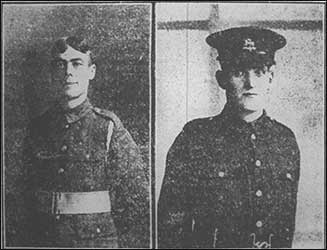 |
Pte J A S Smith & Pte C W Butlin
|
The Rushden Echo, 2nd February 1917, transcribed by Kay Collins
Higham Ferrers Soldiers - Posted as Missing - Comrades in Arms
News has been received from official sources that two Higham Ferrers soldiers—Pte C W Butlin, 14339 Queen’s Royal West Surreys, and Pte J A S Smith, 14336 of the same regiment—have been posted as missing. They were comrades and both served in the 16th Platoon, D Company.
Their wives—Mrs C W Butlin, of 19 Milton-st, Higham Ferrers, and Mrs J A S Smith, of 12 Thrift-street—would be very thankful to anyone who can send them information. Each received as letter from her husband on Nov 13th, since which date no communication of any kind has come to hand. Both men are posted as missing from Nov 18th.
|
Rushden Echo, 9th March 1917, transcribed by Kay Collins
Higham Ferrers Soldier Wounded – Private George Hurst – An Old Territorial
A field-card was received yesterday morning by Mr and Mrs G Hurst, of Lancaster-street, Higham Ferrers, to the effect that their son, Pte George Hurst, Northants (Territorial) Regiment, has been wounded in action in France.
Pte Hurst has been a Territorial some years, and was called up for service on the outbreak of war. He went through the Dardanelles campaign practically without a scratch, and after the withdrawal there he came home with his regiment, and was sent out to France. He has three brothers in the Army, one serving in France, one in Mesopotamia, and the other being in training at home.
|
|
Rushden Echo, 9th March 1917, transcribed by Kay Collins
Higham Ferrers Soldier Invalided - Suffering from Gunshot Wounds
Corpl. George Henry Boxall, 31174, of the Northamptons, son of Mr. and Mrs. J. G. Boxall, of 28 Wellingborough-road, Higham Ferrers, is officially reported to be in the 12th General Hospital at Rouen, suffering from gunshot wounds in the right knee.
The Matron of the hospital has forwarded the following letter to Corpl. Boxall’s parents: “I am sorry to tell you that your son, Corpl. Boxall has been wounded in the knee and is here. He had an operation, and we hope he will go on satisfactorily, and will be able to get to England.”
Pte. W. Stimpson (Higham Ferrers), of the same regiment, A Company, writes under date February 13th: “Dear Mrs. Boxall—I am very sorry to tell you that your son, Corpl. Harry Boxall, was wounded last night. You need not worry yourself about him at all, as it is not a dangerous wound at all. He was hit in the knee by a small piece of shell late last night, and as I came from Higham Ferrers he asked me to drop you a line and tell you. He will write as soon as he can. I hope he will soon be able to get back to the battalion again.”
|
Rushden Echo, 16th March 1917, transcribed by Kay Collins
Higham Ferrers Soldier’s Pluck — Saves a Rushden Comrade by Carrying Him 900 Yards Though Himself Wounded
Mrs Clark of 40, Pemberton-street, Rushden, received news last Saturday that her son Lance-Corpl. E Clark, of the Northants Regt., has been wounded for the third time. The information was sent by the soldier himself, who briefly wrote that he had been wounded and had arrived in England.
In a subsequent letter to his mother Lance-Corpl. Clark reveals the fact that he probably owes his life to a Higham Ferrers comrade, and , anxious that this fact shall be known to as wide a circle of the public as is possible, he asks that the information shall be published in the “Rushden Echo”. He writes: “I am pleased to say I feel good, considering that I have got about 11 wounds, but I am better off here than in France. I knew I should get one. We went over the top on the 3rd. And I got to the Hun’s front line before I was wounded. The man who saved my life is a chap named Hurst, from Higham: you know his mother. Although he was wounded in the neck he carried me about 900 yards to the aid post, and I should like it to be put in the “Rushden Echo.” Before I met him I had been crawling about the ground, with shells dropping like rain, and it is no doubt I should have died through loss of blood.”
Lance-Corpl. Clark evidently refers to Pte. George Hurst (son of Mr and Mrs G Hurst, of Lancaster-street, Higham Ferrers) whom we reported wounded in our last issue.
Mr and Mrs Hurst will have reason to be proud of their gallant son’s self-forgetfulness and bravery in risking his own life for the purpose of saving Lance-Corpl. Clark, and we are entirely in agreement with lance-Corpl. Clark’s desire that the matter shall be brought to the public notice, as apparently no reference has been made to the incident by the hero himself.
|
|
Rushden Echo, 16h March 1917, transcribed by Kay Collins
Higham Ferrers Soldier’s Heroic Act
A Quart of Blood For a Wounded Comrade – A Life Saved
Pte. J.H. Charles, son of Mr. Chas. Charles, of Higham Ferrers, has proved himself a worthy example of that spirit of unselfishness towards his comrades that is the characteristic of the British soldier.
Writing to a former shopmate from a hospital in Paignton, S. Devon, Pte. Charles gives some interesting particulars regarding a surgical operation in which he was a voluntary and willing participant: i.e. the transfusion of blood from his own body to that of a wounded comrade whose life depended on it.
After referring to the fact that his wound, which he received last October, is healed, and that he is making satisfactory progress he writes:
“I did a fellow her a good turn last week, I saved his life. The doctors asked for someone to volunteer to give blood, so i did. The fellow was about dead: he had lost a lot of blood from his wound in his leg, so they took 32 ounces of blood from me, or about a quart, and put it into him. I was conscious all the time, and saw them do it all. They are very cleaver doctors here, but they had to cut his leg off as well. It has made me a bit weak but they are feeding me up alright: brandy, port wine, stout, milk and eggs, and I am able to get about a bit again. The other fellow is going on all right now, and is quite cheerful, though they have had a sister and nurse with him day and night until today, and now they have brought him and put him at the side of me, and he tells me that I am his brother now.”
Continuing, Pte. Charles expresses pleasurable anticipation in the thought that he may be allowed to come home shortly, and says that seven stitches were put into the wound made in his arm for the purpose of transfusion.
|
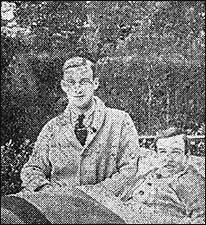 |
|
Pte Charles & Pte Macy
|
The Argus, 6th April 1917, transcribed by Kay Collins
Gave His Own His Blood to Save His Friend
We have pleasure in giving a photo this week of Pte. J. W. Charles (seated) of Higham Ferrers, who gave twenty-three ounces of blood and thus saved the life of his friend, Pte. Macy, of Stourton, seen lying in bed. Although wounded himself, this gallant Northamptonshire soldier cheerfully offered his own blood to save the life of his friend., Out of the horrors of this war have come many examples of “Greater love hath no man than this,” but the sacrifice of Pte. Charles, outside the glamour and excitement of the battlefield, is one of those deeds much deepens our pride in the brave boys of our county and sheds an additional lustre upon the character of the British soldier.
|
The Rushden Echo, 20th April 1917, transcribed by Kay Collins
Higham Ferrers Soldier A Prisoner of War - Rifleman W F Bullworthy
A postcard has been received by Mr John Bullworthy, of 2, Bedford-row, Higham Ferrers, from his brother, Pte William Fredk. Bullworthy, 13301 King’s Royal Rifles, to the effect that he is a prisoner of war in Germany. He says he is going on well, but the weather there is not nice, there being plenty of snow.
Pte. Bullworthy went out to France on February 19th 1916, and was taken prisoner on July 7th.
|
Rushden Echo, 27th April 1917, transcribed by Kay Collins
Home Again—Mr. Percy Gadsby (son of Councillor W. H. Gadsby), who went out to Canada several years ago, has come home on short leave, having joined as a private in a Canadian regiment. Before going abroad he was employed by Messrs. Simpson and Mason, solicitors, High-street, Higham Ferrers.
In Hospital - Pte. F. Tandy, son of Mr. and Mrs. Tandy, Grove-street, Higham Ferrers, is in Christchurch (Hants) Red Cross Hospital suffering from trench feet.
|
|
Rushden Echo, 4th May 1917
Pte. Percy Gadsby, of the Australian Field Artillery, returned to France on Tuesday last, after ten days’ furlough, which he spent with his parents, Councillor and Mrs. W. H. Gadsby. Pte. Gadsby’s brother William is with the Australian Forces in Egypt.
|
Rushden Echo, 4th May 1917, transcribed by Kay Collins
Casualties—Mrs. C. E. Pattison, of 30 Wellingboro’-road, Higham Ferrers, has received official news that her second son, Pte. C. E. Pattison, 33207 – Bedfords, has been brought home from France and is seriously ill in hospital at reading with pulmonary tuberculosis. Pte. Pattison’s parents this week visited their son in hospital and found him going on fairly well. The young soldier enlisted in the summer of 1915, and went out to France some months later.
|
|
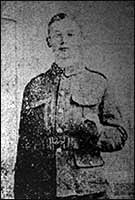 Rushden Echo, 11th May 1917 Rushden Echo, 11th May 1917
Wounded in Palestine – Acting-Corporal W S Webb
Acting-Corporal William S Webb, 201094 Northants Regt., son of Mr. and Mrs. J. Webb, of 11 Grove-street, Higham Ferrers, is officially reported as having been wounded during the fighting in Palestine on April 19th.
The wounded soldier has been in Egypt since twelve months last November. He enlisted about two years ago, up to which time he was an employee of the Co-operative Boot Productive Society, Higham Ferrers.
|
Rushden Echo, 29th June 1917, transcribed by Kay Collins
Sergt. G. H. Hall, R.F.C., son of Mr. J. Hall, 4 Commercial-street, Higham Ferrers, formerly of Raunds, has been awarded the Meritorious Service Medal for valuable services rendered in France. He enlisted soon after the outbreak of war, and was formerly apprenticed to the engineering at Messrs. Masters Brothers, of Raunds. Sergt. Hall is a native of Raunds.
|
Rushden Echo Friday 29th June 1917, transcribed by Susan Manton
Allotment Holders
At a meeting of the National Service Committee recently it was decided to give help to the wives of allotment holders whose husbands are serving with the colours. This assistance will be rendered free of charge, and applications may be made to the Secretary Mr. E. W. Pratt, 1 York Street. The Mayor (Ald. T. Patenall) has made a kind offer in this connection – he will pay a man out of his own pocket to devote his whole time to the cultivation of such allotments.
|
Rushden Argus, 27th July 1917, transcribed by Kay Collins
Higham Ferrers - Naval Reservists—On Tuesday morning several men left Higham Ferrers for Leicester to join the Royal Naval Division. These included Mr. G. A. Chambers (clerk at the Midland Railway Station) and Messrs W. Howard and W. Dickenson (employed at Mr. Chas. Parker’s factory).
|
|
 Rushden Echo, 10th August 1917 Rushden Echo, 10th August 1917
Higham Ferrers Seaman on Leave
Mr. John Dowling of H.M.S.--, who has been home on leave for a few days. He has been rendering splendid service in assisting to rescue from drowning the victims of the submarine warfare.
|
|
Rushden Echo, 31st August 1917, transcribed by Kay Collins
Military Medallist a Prisoner—Mr. and Mrs. James Neville, acting steward of the Higham Ferrers Working Men’s Club, received a postcard on Wednesday morning from their son, Corpl. Arthur Neville, Military Medallist, of the Northants Regt., who has been reported missing since the Battle of the Dunes. He states that he is a prisoner of war in Germany. He says he is all right, and adds that Bert Chettle (Rushden) is with him and is wounded.
|
|
Rushden Echo, 31st August 1917, transcribed by Kay Collins
Prisoner in Germany—At the beginning of June we published the news that 6083 Pte. G. Rainbow, of the Middlesex Regiment, husband of Mrs. G. Rainbow, of 7 Commercial-street, Higham Ferrers, had been missing from his regiment since April 23rd. We are pleased to report that Mrs. Rainbow has now received two postcards from her husband, showing that he is a prisoner of war at Limberg, Germany. Judging from his postcards, he had previously sent a letter and another postcard, but these have not been received. Pte. Rainbow writes that he is keeping fairly well, but asks that some food may be sent to him. Mrs. Rainbow’s brother, Seaman Ralph Barnes, has been a prisoner in Germany for nearly three years.
|
Rushden Echo, Friday 28th September 1917, transcribed by Kay Collins
Invalided Home
Driver Reg Brown, R.F.A., son of Mr T Brown, of Vine Hill Farm, has been invalided to England, and arrived at Southampton Hospital on Saturday last, wounded and suffering from enteric fever. While in action on the Ypres front, Pte Brown was wounded in the knee, and he subsequently contracted enteric. Two years ago he joined the Royal Veterinary Corps, and after twelve months’ service in that regiment he was transferred to the Royal Field Artillery. He went out to France at the beginning of May this year. He is now making good progress towards recovery, the critical stage of the fever having been passed.
|
Rushden Echo, Friday 26th October 1917, transcribed by Kay Collins
Wounded—Pte. Alfred Coles, of the Manchester Regt., son of Mr and Mrs T Coles, of High-street, Higham Ferrers, has been wounded a second time, and he is also suffering from frostbitten feet. He is now in hospital in Manchester. Pte. Coles was formerly in the employ of Mr R A Wheeler, butcher, of Rushden.
|
Rushden Echo, 16th November 1917, transcribed by Kay Collins
Higham Ferrers Soldier – Wounded for the Second Time – Corporal T Breary
Mrs T Breary, of 9 Warmonds-hill, Higham Ferrers, has received official news that her husband, Corporal Tom Breary, Duke of Cornwall’s Light Infantry, was wounded in the left arm on November 4th, and that he is now in hospital at Sheffield.
This is the second time Corpl. Breary has received injury, having been previously blown up by a shell, sustaining severe shell shock. Corpl. Breary was called up as a reservist on the outbreak of war.
|
Rushden Echo & Argus, 19th April 1918, transcribed by Kay Collins
Higham Ferrers Soldier in The Great German Offensive
Pte. Joseph Charles, of Higham Ferrers, reported in last week’s “Rushden Echo” to have been recommended for a medal, sends an interesting letter to his sister, Mrs. H. Denton, of Warmond’s Hill, Higham Ferrers, in the course of which he says:-
“Just a few lines to let you know I am all right. I think the Lord must have been looking after me ever since this bloody battle has been on, for it has been terrible. We have done very good work—the 24th Division. Our C.O. deserves the V.C. He has been a ‘brick’. I might say I have done my very best. I have killed a few Huns, so I have revenged my two lost brothers. I was almost captured twice, but I have got through up to the present. I have simply been smothered in our brave lads’ blood, through dressing their wounds. But the Hun has suffered a lot more than us; in fact, at least four times more.
“The Northamptons have upheld their good name. I am sorry to say this battle has put a stop to leave for a little while, or I should have been home by now, but, still, I have the leave to come, so cheer up, and we shall soon all be in Blighty again, for I think this affair will just about smash the Germans.”
|
|
Rushden Echo, 26th April 1918, transcribed by Kay Collins
Higham Ferrers - 41896, Rifleman Herbert William Warr, of the Royal Irish Rifles, has written to his parents, Mr and Mrs H H Warr, of 20, Grove-street, Higham Ferrers, stating that he is quite well, although a prisoner of war in Germany, The card is dated April 2nd. Rifleman Warr has been in France altogether over twelve months, although he was once sent to Blighty with dysentery. He enlisted over three years ago, up to which time he was employed by Mr William Hector, currier, Higham Ferrers.
|
Rushden Echo, 26th April 1918, transcribed by Kay Collins
Higham Ferrers - Mr. and Mrs. Hy. Espin 28, Commercial-street, Higham Ferrers, have received news that their son, Rifleman Ellis Espin, A/2o1195 K.R.R.'s, has been admitted to the 1st Southern General Hospital, Edgbaston, Birmingham, suffering with trench fever and debility. Previously wounded in the hip by shrapnel, he had recovered and was home on leave eight weeks ago. Before joining up, about two years ago, he was employed at Mr. C. W. Horrell’s factory, Rushden. Mr. and Mrs. Espin have also a younger son, Frank Espin, who has served with the R.F.A. in France for over two years.
|
| Rushden Echo, 26th April 1918, transcribed by Kay Collins
Higham Ferrers - Mrs. George Britchford, of 110, High-street, Higham Ferrers, received official news on Sunday morning that her husband, Pte. Geo. Britchford, Royal Fusiliers had been missing from his unit since March 5th. On Wednesday morning she received a postcard in the soldier's own handwriting gating that he is a prisoner of war in Germany, and unwounded. Pte. Britchford joined the Colours nearly two years ago, prior to which time he was in the employ of Messrs. Ebenezer Claridge and Sons, Rushden. He has been in France altogether over eight months, and was wounded twelve months ago last February, when he was sent to Blighty from February to August, then proceeding to Ireland. He returned to France in November last.
|
Rushden Echo, 26th April 1918, transcribed by Kay Collins
Higham Ferrers - Mr. and Mrs. Robert Tandy, of 34, Grove-street, Higham Ferrers, have received a postcard dated March 23rd, from their son, 65496, Corpl. Albert Robert Tandy, M.G.C., stating that he is a prisoner of war in Germany and unwounded. Lance-Corpl. Tandy, who joined the Army nearly two years ago has been 14 months at the front. He formerly worked for Mr. Eaton, boot manufacturer, Rushden. Mr. and Mrs. Tandy have another son in France, viz., Pte. Frank Tandy (Yorks Regiment), who has been twice frost-bitten and once wounded.
|
Rushden Echo, 26th April 1918, transcribed by Kay Collins
Higham Ferrers - Pte. Frank Mason, Middlesex Regiment, has sent a postcard to his wife at 43, High-street, Higham Ferrers, stating that he is quite well and a prisoner of war, and that a letter follows at first opportunity. The card, which is one of our own field-cards bearing the German post-mark, is dated March 27th. Pte. Mason, who formerly worked at the Higham Ferrers Co-operative Boot Productive Society, joined the Army on August 3rd last year and went to Italy in November last, being transferred to the Western front about seven weeks ago.
|
Rushden Echo, 26th April 1918, transcribed by Kay Collins
Higham Ferrers Soldier in the Great German Offensive
Pte. Joseph Charles, of Higham Ferrers, reported in last week’s "Rushden Echo" to have been recommended for a medal, sends an interesting letter to his sister, Mrs. H. Denton, of Warmond's Hill, Higham Ferrers, in the course of which he says:—
"Just a few lines to let you know I am all right. I think the Lord must have been look¬ing after me, ever since this bloody battle has been on, for it has been terrible. We have done very good work—the 24th Division. Our C.O. deserves the V.C. He has been a 'brick.' I might say I have done my very best. I have killed a few Huns, so I have revenged my two lost brothers. I was almost captured twice, but I have got through up to the present. I have simply been smothered in our brave lads' blood, through dressing their wounds. But the Hun has suffered a lot more than us; in fact, at least four times more.
"The Northamptons have upheld their good name. I am sorry to say this battle has put a stop to leave for a little while, or I should have been home by now, but, still, I have the leave to come, so cheer up, and we shall soon all be in Blighty again, for I think this affair will just about smash the Germans."
|
The Rushden Echo Friday 3rd May 1918, transcribed by Susan Manton
Severely wounded
Mrs. Ada Tearle of 25, Grove Street, Higham Ferrers, has received official news that her son, Pte. Ernest Teale, 201093, Northants Regiment, was admitted on April 19th into the 6th General Hospital, Rouen, suffering from severe gas shell wound. Mrs. Tearle, who is a widow, has since received a note from her son under date April 29th saying “ I have arrived in Blighty, and am at Southampton, waiting to be put on the train and I will let you know what hospital I get in as soon as I reach my destination.”
|
Rushden Echo, 10th May 1918, transcribed by Kay Collins
Higham Ferrers
Gunner F G Felce, R.G.A., of the ‘Rushden Echo’ staff, and Mayor’s Sergeant, has been promoted bombardier.
Prisoner - After six weeks silence, Mr J W Hartwell, has heard from his son, Pte Stanley Hartwell, Lancashire Fusiliers, formerly of the Northants yeomanry. Pte Hartwell is now a prisoner of war in Germany, and happily is quite well. The German card which he sends is dated March 23rd, so that he must have been taken prisoner at the opening of the offensive.
|
Rushden Echo, 10th May 1918, transcribed by Kay Collins
Gallantry—Lance-Corpl. J. H. B. Charles, Northants Regiment, of 15 Thrift-street, Higham Ferrers, has been recommended for the Military Medal for the general good work he has done on the battlefield as regimental stretcher-bearer, in France. He joined the forces in November 1915, and went to France in October 1916. The next month he was wounded in the left arm, and after this gave 32ozs. of blood from his right arm and therefore saved a comrade’s life as reported at the time in the “Rushden Echo.” Before enlisting he was employed at Mr. Owen Parker’s boot factory.
|
Kettering Leader, 14th June 1918, transcribed by Kay Collins
In the Hands of the Huns
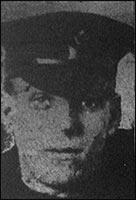 Mr and Mrs Walter Knight, of 3 Westfields, Higham Ferrers, have received a postcard from their son, Rifleman A E Knight, Rifle Brigade, stating that he was a prisoner of war in Germany and wounded. Mr and Mrs Walter Knight, of 3 Westfields, Higham Ferrers, have received a postcard from their son, Rifleman A E Knight, Rifle Brigade, stating that he was a prisoner of war in Germany and wounded.
Previous to enlisting he was employed at Mr H R Patenall’s factory, Higham Ferrers, and was a corporal in Higham St Mary’s Church Lads’ Brigade. Joining up in October 1917, he went to France last April.
|
|
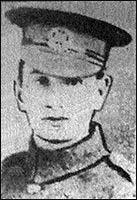 |
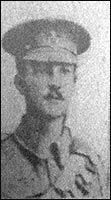 |
|
Pte W D Parker,
South Lancs Regt. Wounded & a prisoner.
|
Pte H E Coles, Royal Fusiliers - in hospital, gassed.
|
|
|
Rushden Echo, 19th July 1918, transcribed by Kay Collins
The Military Medal has been awarded to Corpl. R. C. Horner, 9132, Northants regt., of Higham Ferrers.
Mrs. Turnock, of 23, Corporation-terrace, Higham Ferrers, wishes to thank all kind friends for the sympathy shown to her in the loss of her husband, Pte. T. Turnock, who died in France of pneumonia.
War prisoner—Mr. and Mrs. J. Tate, of Westfield-terrace, have received official news that their son, Pte. Arthur Thomas Tate, M.G.C., previously reported missing, is a prisoner of war in Germany. They have also received a letter from their son, dated May 12th, from Limburg, as follows: “Just a few lines to let you know that I am all right and in the best of health. I should just love a parcel and a packet of Woodbines, and I hope you will send them as soon as possible, as I dare say you know I am a prisoner of war. You can send a nice novel, something interesting to read. I have got a nice little job at boot repairing. Don’t forget a piece of soap and some biscuits, please.” Mr. and Mrs. Tate have another son, serving in Egypt.
|
|
Rushden Echo, 30th August 1918, transcribed by Kay Collins
Casualty—Mrs. A. Robinson, who resides with her mother, Mrs. Lambert, at 13 Grove-street, Higham Ferrers, yesterday received news from her husband, A.B. A. Robinson, of the R.N.D., that he has been wounded and admitted to hospital. A.B. Robinson, who is a Rushden man, joined the Colours twelve months ago, and has been on the Western front about nine months. He was gassed in March last and was sent to England for a month or two, returning to France about six weeks ago. He was formerly employed by Messrs. Green and Coe, boot manufacturers, Rushden.
|
| Rushden Echo, 13th September 1918, transcribed by Kay Collins
WAR PRISONER— Pte. Thomas Frederick Pettit (Manchester Regiment), son of Mr. and Mrs. W. Pettit, of 31, Milton-street, Higham Ferrers, who, as previously reported in the "Rushden Echo," has been missing from his unit since April last, has sent a postcard to his mother stating that he is a prisoner of war in Germany and quite well.
|
Rushden Echo, 20th September 1918, transcribed by Kay Collins
Pte. F. Tandy, Yorkshire regiment, eldest son of Mr. R. Tandy, of 34 Grove-street, Higham Ferrers, has received a parchment as follows: “Your gallant conduct on March 25th, 1918, at Licourt, has been brought to my notice, and I congratulate you on the good service you have rendered to your country.” This is signed by the Commanding Officer of the Battalion and the Major-General commanding the Division. Pte. F. Tandy is now a prisoner of war, as is also his brother Herbert.
|
Rushden Echo, 27th September 1918, transcribed by Kay Collins
Pte E Kilsby, Transport Section, who is in hospital with appendicitis, has taken a turn for the better.
|
Rushden Echo, 27th September 1918, transcribed by Kay Collins
Gassed—Pte John Cox, of High-street, Higham, is in hospital in England, suffering from poison gas.
|
Rushden Echo, 1st November 1918, transcribed by Kay Collins
Wounded—Mrs Pettit, of 10, Commercial-street, Higham Ferrers, has received a card stating that her husband, Lance-Corpl. Arthur Pettit, Middlesex Regt., is in the 1st Southern General Hospital, Birmingham. A comrade write that Lance-Corpl. Pettit is suffering from a wound in the right arm. Lance-Corpl. Pettit joined the Colours on June 1st 1916 and went to France on September 14th the same year. He was, prior to enlistment, employed by Messrs Chas Parker, Ltd., boot manufacturers, Higham Ferrers.
|
Rushden Echo, 1st November 1918, transcribed by Kay Collins
Military Medal—Mrs Thompson, of 3, Spring-gardens, has received a letter from her husband, Sergt. John Burrows Thompson, Northants Regt. (Pioneers), stating he has been awarded the Military Medal, for gallantry on the field. Sergt. Thompson who was formerly a member of the Higham Ferrers Fire Brigade, joined the Colours in May 1915, and went to France in March 1916. He is already a holder of a bronze medal for skill in musketry.
|
Rushden Echo, 6th December 1918, transcribed by Kay Collins
Home Again—Pte Arthur Tate, of the Machine Gun Corps, aged 19, son of Mr and Mrs J Tate, of 1, Westfields, Higham Ferrers, who was taken prisoner of war in April this year, has now reached home. He was unwell when he arrived in England, but is now improving considerably. Mr and Mrs Tate have another son who is serving in Egypt.
|
Rushden Echo, 27th December 1918, transcribed by Kay Collins
Captain William Hudson, 12th Battalion Rifle Brigade, is spending a short leave at Higham Ferrers. His Division (the 20th) was this year thrice mentioned in Sir Douglas Haig’s despatches. Capt. Hudson was formerly a teacher at the Higham Ferrers Council school.
|
| Rushden Echo, 10th January 1919, transcribed by Kay Collins
Five Days Without Food—Private Fred Pettit, son of Mr W Pettit, Mayor’s Sergt., of 31 Milton-street, has returned home after nine months in the hands of the Germans. Most of the time he was working behind the lines, at top pressure, on starvation diet. He was once kept without food for five days, no parcels being allowed to men working under those conditions. The work the British prisoners were employed on by day was, he says, constantly destroyed or damaged by bombs from British aeroplanes by night. When our men showed their natural glee over the destruction they were clubbed with rifles and kicked by the brutal German guards. Pte Pettit was suffering from a bad attack of dysentery for some time before his release, the result of starvation. We are pleased to say he is now recovering.
|
The Rushden Echo Friday May 9th 1919, transcribed by Susan Manton
Pte. J. Charles, Northampton of 15, Thrift Street, Higham Ferrers, received from the Military Authorities last week the Military Medal which he won during the war.
|
|